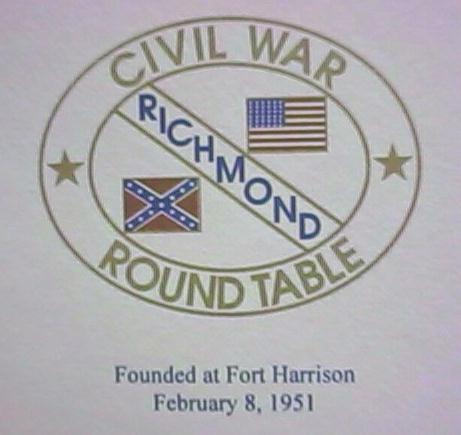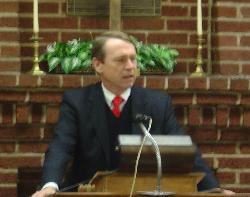


January 2005
rcwrt.org
First Vice President: Rob Monroe, Editor Richard Forrester 2416 Edenbrook Dr. Second Vice President: Richmond, VA 23228-3040 Shep Parsons rmonroe@richmond.com
January 2005 PROGRAM Mike Gorman, "Richmond Again Taken: Photographing Richmond, 1858-1865" 8:00 p.m., Tuesday, January 11, 2005, at the Boulevard United Methodist Church, 321 N. Boulevard, Richmond, VA (corner of Boulevard and Stuart Ave.) Enter the basement door on the right side under the front steps. Many of the most famous images of the fallen Capital of the Confederacy have never, until now, been placed in their proper historical context. This multimedia talk will examine some of the images taken of Richmond immediately following the evacuation of the Confederate Government using new research to locate and interpret the images. This talk will also share some important new discoveries and many extremely rare images. Mike Gorman is a Richmond-based historian who specializes in the City of Richmond during the Civil War. He is the creator and webmaster of Civil War Richmond (www.mdgorman.com), an online research project that documents the various sites and personalities within Richmond during the war. It is his labor of love and consists of primary and a smattering of secondary accounts related to Richmond. This website generates over 300 hits per day, and has grown to the staggering size of 9,348 individual pages and over 1200 megabytes of information. He works for the National Park Service and is working on several books in his private time.
Summary of December Meeting
 |
Lectures Will Offer Theological View of Civil War
Four lectures about "The Civil War as a Theological Crisis," will be held January 24-26 at Union Theological Seminary and Presbyterian School of Christian Education on Brook Road. Professor of Christian Thought at Wheaton College, Mark Noll, an authority on the interaction of Christianity and culture in the 18th and 19th centuries, will be the speaker. Noll will examine the Civil War as a turning point in Christian thought. How could readers of the same Bible come to such different conclusions resulting in the violence and destruction of civil war? There is no charge to attend the lectures: "The Nature of the Crisis," "The Special Problem of the Bible and Slavery," "The Crisis Observed from Outside the United States," and "The Meaning of the Crisis Today." Noll holds a Ph.D. in American religious history from Vanderbilt University and has served as an editor for Christianity Today. A prolific writer, some of Noll's books include: America's God: From Jonathan Edwards to Abraham Lincoln, The Scandal of the Evangelical Mind, and Turning Points: Decisive Moments in the History of Christianity. Other notable guests, all graduates of Union-PSCE, will speak at various events during the lecture series. Theodore J. Wardlaw, president of Austin Presbyterian Theological Seminary, will preach at worship on Tuesday, Jan. 25 at 11 a.m. Donald W. Shriver, Jr., former president of Union Theological Seminary in New York, will speak at the luncheon on Tuesday. Pamela Mitchell-Legg, professor of Christian education at Union-PSCE's Charlotte campus, will speak at the dinner Tuesday evening. Reservations are required for meals. A special feature during the lectures will be a tour of the new American Civil War Center. The soon-to-be-completed center at the Tredegar gun foundry in downtown Richmond examines the Civil War from the distinct perspectives of African Americans, Northerners and Southerners. Participants in the lectures may choose to visit the facility Tuesday afternoon at 3 p.m. For information on the lectures, registration, and a complete schedule of events, visit the website at www.union-psce.edu/sprunt/ or call (804) 278-4228 or 1-800-229-2990 ext 228.
Upcoming Events
Wednesday, January 19 Robert E. Lee Birthday Celebration at his birthplace, Stratford Hall in Westmoreland County. Free admission and a lecture, "Lee's Inner Quest," at 2 p.m. Info: www.stratfordhall.org
Saturday, February 5 "Freedom Won," a special program on African-American soldiers and civilians at Endview Plantation in Newport News. Info: www.endview.org or 757-887-1862.
RCWRT Monthly Speakers for 2005
Info Sought on Prison Civil War Round Table Jackson Sasser, a graduate student at William & Mary, is working on a history of the Prison Civil War Round Table, which met in the Virginia Penetentiary from 1962-1989. Our Round Table was instrumental in that group's founding and success. Mr. Sasser would be interested in any correspondence or records pertaining to the PCWRT -- most especially its early years -- and would like to talk or correspond with anyone who took a real interest in the work of that group. He can be reached at jnsass@wm.edu; or at 757-221-7695; or at P.O. Box 863, Williamsburg, Virginia 23187.
2005: Official Business and A Look Ahead At the December meeting of the Richmond Civil War Round Table, Bob Krick, Jack Ackerly and Dan Balfour were elected to the executive board for 2005. The new year promises to be another exciting one for RCWRT members. Speakers in the coming months include Dr. James I. "Bud" Robertson, Jr., Frank O'Reilly and Hunter Lesser. Membership dues for 2005 will be mailed to you in January. The ides of March - March 15 - will be the final deadline for 2005 dues. Why put it off until then? Pay your dues at the January 11 meeting, then sit back, relax and enjoy the excellent speakers coming to the Round Table this year.
Information may be emailed to rmonroe@richmond.com or Richmond Civil War Round Table Newsletter Rob Monroe, Editor 2416 Edenbrook Dr. Richmond, VA 23228-3040
Return to News Letters Index
Return to main page

©R.C.W.R.T. 2005